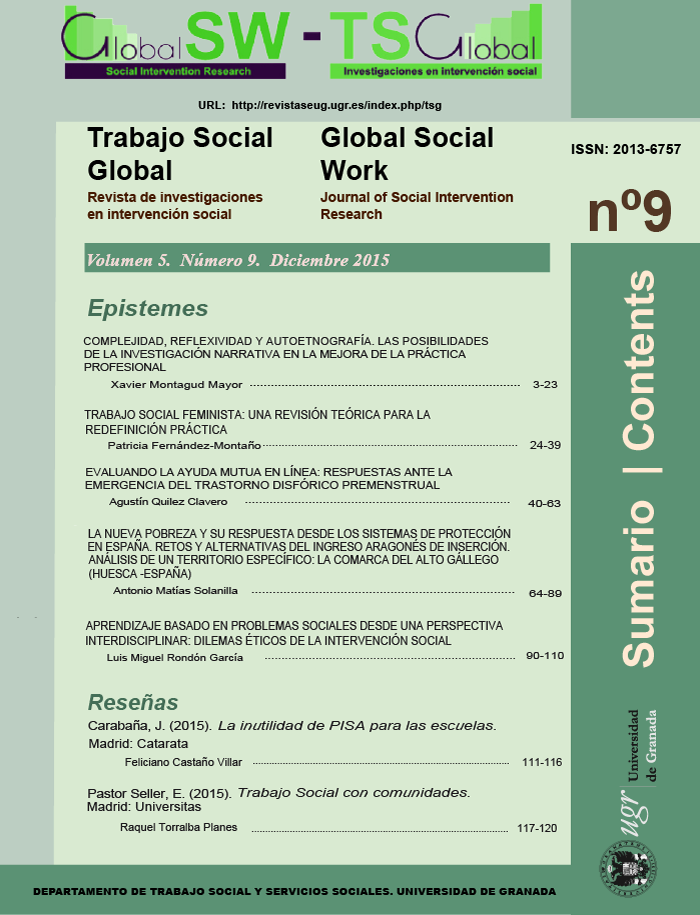La nueva pobreza y su respuesta desde los sistemas de protección en España. Retos y alternativas del Ingreso Aragonés de Inserción. Análisis de un territorio específico: la Comarca del Alto Gállego (Huesca)
DOI:
https://doi.org/10.30827/tsg-gsw.v5i9.3119Palabras clave:
Nueva pobreza, Rentas Mínimas de Inserción, Subsidios de desempleo, Itinerarios de Inserción., New Poverty, Low Incomes, Unemployment Benefits, Inclusion ItinerariesResumen
La actual crisis económica ha modificado sustancialmente el perfil de usuario de Servicios Sociales de Atención Primaria. Claro ejemplo de ello son los beneficiarios de prestaciones económicas de Rentas Mínimas de Inserción. Se puede hablar de un nuevo colectivo de usuarios que responde a la situación social que conocemos como “nueva pobreza”. La aparición de este nuevo colectivo ha obligado a las administraciones públicas a generar nuevas prestaciones económicas como recursos de protección del Estado. Se analizará la respuesta del Sistema Público de Empleo Español a través de su cartera de prestaciones y subsidios de desempleo, así como los Programas de Rentas Mínimas autonómicos vigentes en la actualidad, y veremos cómo, más que complementarse, se solapan unos a otros. Se demostrará que las semejanzas entre ambos sistemas de protección y el hecho de compartir usuarios comunes, debería obligar a una fusión o, al menos, un trabajo conjunto de ambos sistemas de protección. Veremos un ejemplo claro analizando la evolución del Ingreso Aragonés de Inserción en la Comarca del Alto Gállego (Huesca, España), y el perfil de las personas beneficiarias del mismo en esta nueva realidad social.
The current economic crisis has substantially changed the user profile of Primary Care Social Services. An obvious example are the present beneficiaries of the Minimum Insertion Income (economical compensation for people with low incomes), which can be considered as a new group of users responding to the social situation that is known as "new poverty". The appearance of this new group has forced the public administrations to incorporate new economic benefits in the State’s protection system. In this paper we analyze the response of the Spanish Public Employment System through its portfolio of services and unemployment benefits, as well as the Minimum Income Programs currently in force at each Spanish Autonomous Region; we will see how, rather than complemented, overlap each other. It is made evident that the similarities between the two systems of protection (national and regional) as well as the sharing of common users, should force a merger of the two systems or, at least, a joint work of both of them. We will see a clear example by analyzing the evolution of the Aragonese Insertion Income in the Alto Gállego (Huesca, Spain) and the current profile of its beneficiaries in this new social reality.
Descargas
Citas
Aguilar, M; Gaviria, M; Laparra; M (1995) "La caña y el pez: Estudio sobre los salarios sociales en las Comunidades Autónomas. FOESSA" Madrid
Asociación Estatal de Directoras y Gerentes de Servicios Sociales (2015) "Informe sobre el Estado Social de la Nación 2015" Madrid
Díaz Moreno, V y Sotomayor, E (2011) "Sociedades en crisis." Temas para el Debate nº 205. Diciembre 2011 pag 27.30
Fantova, Fernando (2014) "Diseño de Políticas Sociales. Fundamentos, estructura y propuestas." Editorial CCS. Madrid
Laparra, M et. al (2014) "El desplome de los ingresos de los pobres y la intensificación de los procesos de exclusión social en España". Educación y futuro nº 30 (2014) pp 81-87
Marí-Klose, Pau y Marí-Klose, Marga (2013) "Como se reduce la pobreza en los países ricos? Políticas de aseguramiento, redistribución y asistencia social en el Estado del Bienestar". En Del Pino, Eloisa y Rubio, María Josefa (ed.): "Los Estados de Bienestar en la encrucijada. Políticas sociales en perspectiva comparada." Tecnos Madrid. pp 310-338
Mendiara-La Plaza, C (2014) "Las redes de Apoyo Social de la Nueva Pobreza atendida en el Centro Municipal de Servicios Sociales dle Barrio de la Magdalena en Zaragoza". Revista Portularia Volumen XIV nº 1 pp 73-86
Paugman, S y Duvoux, N (2008) "La régulation des pauvres". París PUF. Pág 35
Red Europea de lucha contra la pobreza y la exclusión social (EAPN-ES) (2009) "El impacto de la crisis en la pobreza y la exclusión social: Diagnóstico y actuaciones" Madrid
Sánchez Morales, María Rosario (2012) "Los nuevos pobres y la población "sin hogar" en España." En Tezanos, José Félix (ed.): Los nuevos problemas sociales. Duodécimo foro sobre tendencias sociales. (pp. 301 - 324) Madrid. Sistema
Tezanos, J.F., Sotomayor, E., Sánchez Morales, R., Díaz, V. (2013) En los bordes de la pobreza. Las familias vulnerables en contextos de crisis. Madrid. Biblioteca Nueva
Descargas
Publicado
Cómo citar
Número
Sección
Licencia
Las personas autoras que publican en esta revista están de acuerdo con los siguientes términos:
- Las personas autoras conservan los derechos de autoría, garantizando a Trabajo Social Global-Global Social Work el derecho a la primera publicación del trabajo que remiten a la revista para que sea sometido al preceso editorial.
- Autores y autoras conocen que su obra se publica bajo una Licencia Creative Commons que permite a otros compartirla con un reconocimiento de la autoría del trabajo y de su publicación inicial en esta revista.
- Los/as autores/as ceden a Trabajo Social Global-Global Social Work los derechos de explotación de la obra que haya sido publicada en esta revista, autorizando a la Editorial de la misma para el ejercicio de una libre reproducción, distribución y comunicación pública. Autores y autoras conocen que su obra será almacenada en servidores y reproducida en soporte digital para su incorporación a repositorios institucionales y bases de datos que facilitarán el acceso libre y gratuito al texto completo de la obra.
- Los/as autores/as pueden distribuir la versión post-print de la obra publicada en TSG-GSW (por ejemplo, situarlo en un repositorio institucional o publicarlo en un libro), con un reconocimiento expreso de su publicación inicial en esta revista.
Los derechos de copyright sobre los textos publicados en Trabajo Social Global-Global Social Work, así como la política editorial de la misma respecto al auto-archivo o depósito en repositorios institucionales o temáticos, están identificados en la base de datos Dulcinea.






















